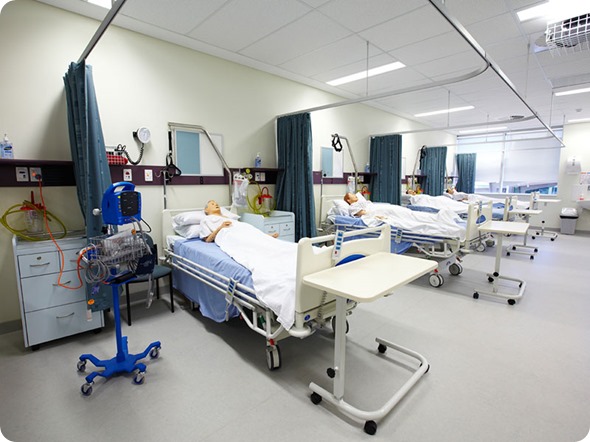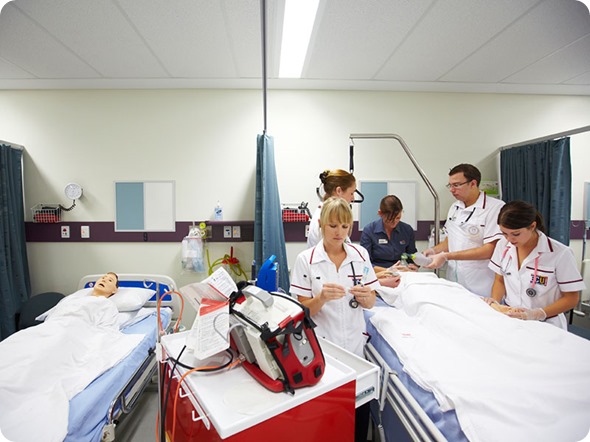I think role playing plays an important role, it's a really interesting question because role playing is somewhere on that spectrum of simulation. There is the potential for patients to play a role to relive an experience or an actor can be used.
There's a real benefit in really sensitive scenarios like post-coronial role playing, where we need to learn from past mistakes, but it would be insensitive to use patients or similar groups of patients that may be affected. To some extent, actors can display the emotions as you’d expect them. I guess they have license to take it where it needs to go and we accept that license.
When actors are showing the human aspects of fear, pain or distress, it's a little easier for those that are watching than if a patient is reliving the scenario. And so I think there's a sensitivity around it.
Role playing is a really good way to demonstrate communication skills and teamwork in different scenarios. But that's not at the exclusion of simulation, because by default when you are using simulation technology. Interactive digital opportunities exist as well where you can interface or use avatars. You can use those for role playing as well. It's not one or the other.
Does role playing occupy an important teaching role within healthcare? What perspectives can role playing provide?
I really think it does, it's important for multi disciplinarily, inter-professional learning because there is some real value in scenarios where you take on another person’s role. It’s useful in a range of applications from learning surgical techniques, completing WHO check lists and with difficult communications around patient care such as end of life care.
You need to step into somebody else's shoes to see what it's like to take on that role. Different scenarios can be used with a variety of lead clinicians from the nurse, to the operating department practitioner.
Can you describe a scenario that would have benefited from the role playing scenario? What did this role playing scenario entail?
The scenario we used in Western Australia in 2007 has definitely benefited patient interaction for all those that have been through it. It has gone on to develop, and is well documented from Edith Cowan University, in Perth.
The key point is looking at how you take something as tragic as death in custody and turn it into an actor based role play in an environment that is safe for people to explore, because you are exploring incredibly sensitive issues.
The scenario included difficult reactions, such as the shame of health professionals around how a patient has been treated. It has many aspects, with multiple departments including the police, the hospital, professional groups and culturally sensitivity issues too. You need to create an environment that's safe, and one of the ways to do that is through simulation to explore and to debrief as well.
We went through the scenario of a young aboriginal man who died in custody within 24 hours after leaving the emergency department, where the care was not as you would expect, both in terms of nursing and medical staff. He was effectively discharged without adequate observations or an x-ray post a crush injury.
He was eventually dragged out of the emergency department and put in a holding cell, really in a state of distress. He died as a result of poor care. When we explored the scenario, the best way we thought to share it safely and to really challenge the humanity of the situation was to use actors.
Can you describe the simulation facility in Edith Cowan University has and the type of simulation training that takes place?
It’s pretty amazing. It's about a 58 bed facility that's set up as functioning wards including oxygen, suction, capacity for high and low fidelity and three highly-flexible simulation suites. It's about 20kms out of the centre of Perth, and it’s part of the ECU Health Simulation Centre.

Edith Cowan University Simulation Centre, courtesy of Edith Cowan University
There’s a range of simulation areas that can be configured to any setting such as emergency departments, a person’s home, community clinics. It actually has multiple lecture theaters linked to it so you can do mass education linked to the simulation.
At the high end it's used for resuscitation, paramedics and surgical interventions. It covers the spectrum, it's probably one of the largest in Australia that I have seen.

Simulated training at the Edith Cowan University Simulation Centre, courtesy of Edith Cowan University
How do you think this particular scenario affected the actors and the professionals involved, what you think they really gained from this invention?
More than I expected, the actors were distressed. Partly because they were playing a part where they had to pretend to hit a nurse, because that was what was wanted, and be angry, agitated and distressed.
Also, the actors were distressed about playing in a part where you knew the care was poor and a person was being treated in a way you wouldn't want anyone to be treated. That affected the actors most as well as the 88 or so nurses that were involved.
It was really distressing to see it played out where you could see points where either the care could have improved or an intervention would have made a difference instead of observation and x-ray.
As well as the pure desensitization of people to what was really unacceptable behavior. Around dragging someone out of the emergency department was just unacceptable. When you replay it people can see it much more clearly when they are caught up in it.
Generally if you have a coronial, it's either for unexpected death or where there's a question about the care the people are getting. If you can assimilate those into some kind of scenario that either replicates or is an amalgam of multiple events it can go to the heart of health professionals, because the last thing they want to do is do harm. So if you can show where it's happened, it resonates in a way that some other things don't.
Do you think any sub group healthcare professionals need simulation training more than others, especially in this human aspect?
I think we probably all need it. I don't know that there's any more or less of a need for different staff. However, for a patient the critical conversation they have are often with medicine because they’re getting a diagnosis. So instruction on communication is really important for medicine.

With allied health, clinical support workers and nursing in particular even, your interactions are often with patients 24 hours a day, day in, day out, you’re there so it’s critical that you can communicate well with patients.
If the patients are not communicating well or they have poor behavior that you're used to seeing every day, you get desensitized. I think it's just important to get a different perspective, to put yourself in the role of the patient, otherwise you can get ambivalent and these scenarios resonate in a way that can’t happen through traditional education.
Do you think it would be worth like having refresher training for senior staff so they don't become biased?
Yes, I do. I think one of the really hard things that happens particularly around patient experience is that people may have really good clinical care and the last thing they remember about their visit, is the fact that their discharge drugs arrived on time or a staff member was rude about arranging transport etc.
It's a bit like going to Italy and then your plane’s late on the way home, and the last thing you remember is that you arrived three hours late and got an extra parking ticket, which spoilt the whole experience.
I think there's something around how you show that to people, in a way that is good for senior staff, because we get used to some unfortunate facts, like we may say, "Oh sorry. You are ready to go home but it will take four hours for you to get discharge forms." We get used to these difficulties and normalize them. But in actual fact it's not acceptable because that's what they'll remember.
What type of training would you like to see taught to the next generation of healthcare within NHS? What would you like see implemented within the NHS?
We're going to need simulation for technical skills for all disciplines along with covering the spectrum of high fidelity and then scenarios that are integrated education early on in their careers.
If I use an example again from Australia, the first year of undergraduate education in every discipline at one of the universities is taught together, 14 disciplines. You build inter-disciplinary trust and understanding for the basic education and skills of others.
The 14 professions will include medicine from this year. They have their professional subject matter, but subjects like communication, philosophy, quality and all those types of values are taught together.
We currently have a weird phenomenon where kids that are integrated in secondary schools are subdivided by discipline or profession at university and then brought back together in a working environment, and expected to form a cohesive group.
I would like to see us exploring that idea and you use simulation and team based learning. That brings a fundamental trust straight off because you understand other disciplines’ educational perspective. I'd love to see that within the NHS.
How achievable do you think that is?
I think it is achievable but would be easier for newer universities as they set up new programs than the older ones. If there was an opportunity for some of these ideas to be supported and facilitated nationally with simulation as a key mechanism for achieving this it would be fantastic.
Where can readers find more information?
About Catherine Stoddart
Catherine is currently the Chief Nurse Oxford University Hospitals NHS Trust.
Catherine was previously the Chief Nurse and Midwifery Officer for the State of Western Australia, based in Perth. Prior to this Catherine held a number of executive delete nursing roles at state and hospital level in Australia.
Catherine has gained a wealth of experience from voluntary work for the Global Health Alliance in Tanzania and community work in Vietnam.
Catherine holds a MBA, MSc and Bachelor of Science in Nursing and is completing a PhD. She is a past beneficiary of the Winston Churchill Memorial Fellowship and a Nuffield Fellowship.